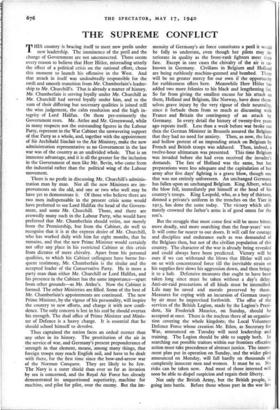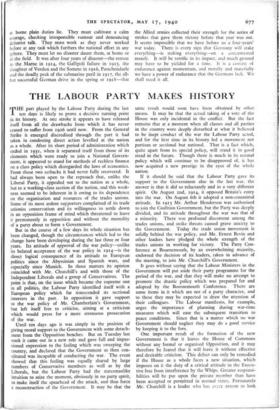THE SUPREME CONFLICT
THIS country is bracing itself to meet new perils under new leadership. The imminence of the peril and the change of Government are not unconnected. There seems every reason to believe that Herr Hitler, misreading utterly the effect of a political crisis on the national effort, chose this moment to launch his offensive in the West. And that attack in itself was undoubtedly responsible for the swift and smooth transition from Mr. Chamberlain's leader- ship to Mr. Churchill's. That is already a matter of history. Mr. Chamberlain is serving loyally under Mr. Churchill as Mr. Churchill had served loyally under him, and to the sum of their differing but necessary qualities is joined still the wise judgement, the calm resolution and the high in- tegrity of Lord Halifax. On them pre-eminently the Government rests. Mr. Attlee and Mr. Greenwood, while in many respects not the outstanding figures in the Labour Party, represent in the War Cabinet the unwavering support of that Party as a whole, and, together with the appointment of Sir Archibald Sinclair to the Air Ministry, make the new administration representative as no Government in the last war was of the country as an undivided whole. That is an immense advantage, and it is all the greater for the inclusion in the Government of men like Mr. Bevin, who come from the industrial rather than the political wing of the Labour movement.
There is no profit in discussing Mr. Churchill's adminis- tration man by man. Not all the new Ministers are im- provements on the old, and one or two who well may be have yet to demonstrate it. Of those who believe there are two men indispensable in the present crisis some would have preferred to see Lord Halifax the head of the Govern- ment, and some Mr. Churchill. Those, and there are avowedly many such in the Labour Party, who would have preferred that Mr. Chamberlain should retire, not merely from the Premiership, but from the Cabinet, do well to recognise that it is at the express desire of Mr. Churchill, who has worked daily with him for eight months, that he remains, and that the new Prime Minister, would certainly not offer any place in his restricted Cabinet at this crisis from dictates of mere chivalry. Apart from his personal qualities, to which his Cabinet colleagues have borne fre- quent testimony, Mr. Chamberlain is the titular and the accepted leader of the Conservative Party. He is more a party man than either Mr. Churchill or Lord Halifax, and his presence in the Cabinet has the same importance—apart from other grounds—as Mr. Attlee's. Now the Cabinet is formed. The other Ministries are filled. Some of the best of Mr. Chamberlain's appointments are continued. The new Prime Minister, by the vigour of his personality, will inspire the country to new efforts, and charge it with new confi- dence. The only concern is lest in his zeal he should overtax his strength. The dual office of Prime Minister and Minis- ter of Defence is a heavy charge. It is essential that he should school himself to devolve.
Thus captained the nation faces an ordeal sterner than any other in its history. The prostitution of the air in the service of war, and Germany's present preponderance of strength in that element, means, among many things, that foreign troops may reach English soil, and have to be dealt with there, for the first time since the bow-and-arrow war of the Norman Conquest. They are likely to be few. The Navy is a surer shield than ever so far as invasion by sea is concerned, and the Royal Air Force has already demonstrated its unquestioned superiority, machine for machine, and pilot for pilot, over the enemy. But the im- mensity of Germany's air force constitutes a peril it would be folly to underrate, even though her pilots may de- teriorate in quality as the front-rank fighters meet their fate. Except in rare cases the chivalry of the air is un- known in Germany. Civilians in Belgium and Holland are being ruthlessly machine-gunned and bombed. There will be no greater mercy for our own if the opportunity for ruthlessness offers here. Meanwhile Herr Hitler has added two more felonies to his black and lengthening list. So far from giving the smallest excuse for his attack on them, Holland and Belgium, like Norway, have done them- selves grave injury by the very rigour of their neutrality, since it forbade them from so much as discussing with France and Britain the contingency of an attack by Germany. In every detail the history of twenty-five years ago repeats itself. Less than a week before war broke out then the German Minister in Brussels assured the Belgians that they had no need for anxiety. Then, as now, the false and hollow pretext of an impending attack on Belgium by French and British troops was adduced. Then, indeed, a twelve-hour ultimatum was presented. This time Belgium was invaded before she had even received the invader's demands. The fate of Holland was the same, but her preparations were less adequate and the capitulation of her army after five days' fighting is a grave blow, though one that was not entirely unforeseen. An unchanged Germany has fallen upon an unchanged Belgium. King Albert, when the blow fell, immediately put himself at the head of his country's troops. King Leopold, who, as a boy of thirteen, donned a private's uniform in the trenches on the Yser in 1915, has done the same today. The victory which ulti- mately crowned the father's arms is of good omen for the son's.
But the struggle that must come first will be more bitter, more deadly, and more searching than the four-years' war. It will come far nearer to our doors. It will call for courage and discipline and endurance such as was demanded of the Belgians then, but not of the civilian population of this country. The character of the war is already being revealed and could always have been predicted. Victory will be ours if we can withstand the blows that Hitler will rain on us with concentrated force till the inevitable strain on his supplies first slows his aggression down, and then brings it to a halt. Defensive measures that ought to have been taken long since must be taken without a day's delay. Anti-air-raid precautions of all kinds must be intensified. Life may be saved and morale preserved by them. Measures for coping with an incursion of German troops by air must be improvised forthwith. The offer of the services of the British Legion, made by the Legion's Presi- dent, Sir Frederick Maurice, on Sunday, should be accepted at once. There is the nucleus there of an organisa- tion covering the whole kingdom; the Local Volunteer Defence Force whose creation Mr. Eden, as Secretary for War, announced on Tuesday will need leadership and training. The Legion should be able to supply both. In searching out possible traitors within our frontiers effective action must take precedence of abstract justice. The intern- ment plan put in operation on Sunday, and the wider plan announced on Monday, will fall hardly on thousands of completely innocent men and women. It must be so. No risks can be taken now. And most of those interned will soon be able to dispel suspicion and regain their liberty.
Not only the British Army, but the British people,. is going into battle. Before those whose part in the war he,, at home plain duties lie. They must cultivate a calm courage, checking irresponsible rumour and denouncing defeatist talk. They must work as they never worked before at any task which furthers the national effort in any sphere. They must let no disaster daunt them, at home or in the field. It was after four years of disaster—the retreat to the Manic in 1914, the Gallipoli failure in 1915, the slaughter of Verdun and the Somme in 1916, Passchendaele and the deadly peak of the submarine peril in 1917, the all- but successful German drive in the spring or 1918—that the Allied armies collected their strength for the series of strokes that gave them victory before that year was out. It seems impossible that we have before us a four-years' war today. There is every sign that Germany will stake everything—is staking everything—on a concentrated assault. It will be terrific in its impact, and much ground may have to be yielded for a time. It is a contest of endurance against momentum, and morally and materially we have a power of endurance that the Germans lack. We shall need it all.



































 Previous page
Previous page